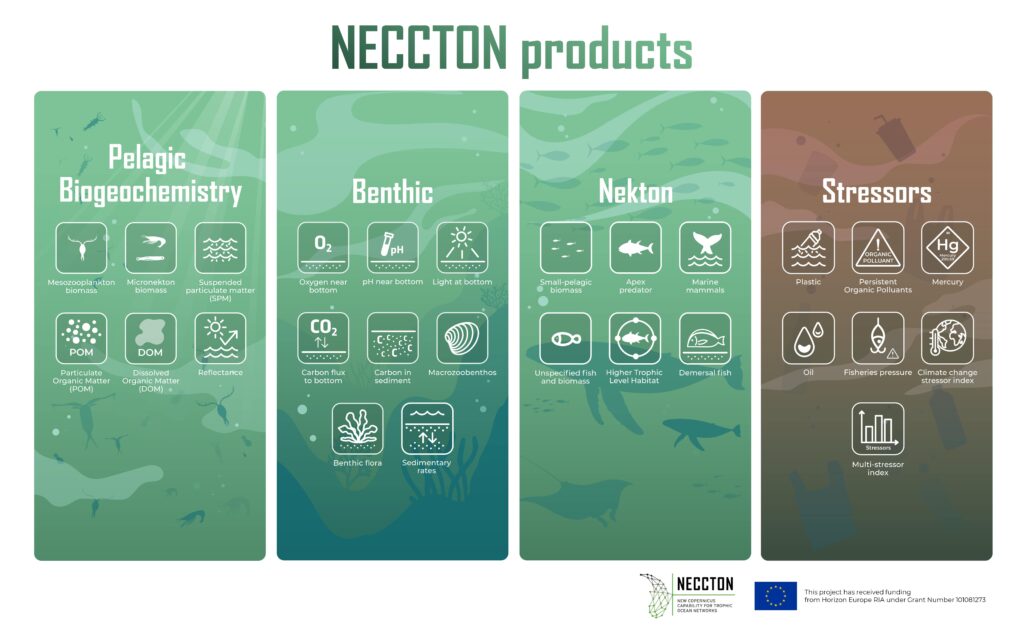The NECCTON project, which stands for “New Copernicus Capability for Trophic Ocean Networks”, is a pioneering four-year initiative funded under the Horizon Europe, the ambitious EU research & innovation framework programme for 2021-2027. NECCTON received an official endorsement by the UN Ocean Decade as project of the Marine Life 2030 programme, reconfirming its commitment to safeguarding the marine ecosystems.
The Ocean Decade is a 10-year framework initiative to identify, generate and use critical Ocean knowledge to manage the Ocean sustainably. Marine Life 2030 seeks to transform the observation and forecasting of marine life for the future for the benefit of all people. This programme will set-up a globally coordinated system to deliver actionable, transdisciplinary knowledge of Ocean life to those who need it, promoting human well-being, sustainable development, and Ocean conservation. As part of this framework, the NECCTON project will develop and disseminate new methods and tools to integrate new biogeochemical and biological data into innovative ecosystem models.
Fuelled by the synergy of twenty-three partner organisations, and led by Mercator Ocean International – NECCTON aspires to significantly contribute to Ocean biodiversity conservation, support food security, and align with European policies that safeguard our marine environments.

Project objectives
The Ocean is vital for human well-being. Covering over two thirds of the planet, it contains rich biodiverse habitats, provides invaluable ecosystem services, is central to global food security, and absorbs significant amounts of heat and carbon dioxide from the atmosphere.1 While the Copernicus Marine Service, implemented by Mercator Ocean International on behalf of the European Commission, offers high-quality data and information for managing Ocean resources, existing models fall short in delivering data on biodiversity and marine food webs. NECCTON seeks to bridge this gap by enhancing the Copernicus Marine Service with new capabilities for modelling fishes, benthic habitats and marine pollution. The project aims to deliver twenty-seven new products, transforming the European capability to predict and protect marine biodiversity and food resources.

About its target users
NECCTON strategically targets a diverse range of users and stakeholders, each poised to benefit significantly from the marine ecosystem prediction system.
These include:
- Scientific community: particularly in the fields of nature conservation, oceanography, cryosphere, and climate research, gaining improved ensemble approaches and data assimilation techniques enhances their ability to map benthos species (meaning organisms that live on the sea floor such as sea stars, oysters, clams, sea cucumbers etc.) and map habitats for unspecified apex predators – in short – predators on top of the food chain such as orcas, tiger sharks etc.
- Maritime end-users: encompassing activities such as fishing, agriculture, tourism, and security industries, as well as local communities.
- Policy and decision makers: further insights into the Blue economy, the evolution of marine pollution and the enhancement of cross-Copernicus services will equip policy makers with valuable information for informed policymaking.
- General public: by contributing to improved safety and awareness of marine biodiversity and fisheries, the NECCTON project extends its impact to the general public, aligning with broader societal goals for biodiversity conservation and responsible fishery management.
Project implementation
NECCTON’s strategy involves building and integrating innovative models that closely mirror the functioning of real marine ecosystems. Using new data-processing chains, including hyperspectral data from satellites, acoustic data, pollution data, and cellular and molecular data, the project aims to demonstrate technological readiness through thirteen case studies around the globe. These studies, co-designed with fisheries and conservation managers, will showcase the practical impact of NECCTON’s advancements and strengthen oceanography in the context of climate change.
NECCTON would ultimately support stakeholders in science-based biodiversity conservation and fisheries management towards sustained seafood availability for generations to come.
Earlier this month, NECCTON released a best practices guide for model development, outlining practical strategies for model implementation, fostering interoperability across Copernicus Marine’s Monitoring and Forecasting Centres (MFCs). The guide also provides instructions for model testing and distribution of code modular model development and implementation.
Impact and Sustainability
Upon completion, NECCTON aims to provide the Copernicus Marine Service with the scientific and technical capabilities to sustain twenty-seven new products in their operational portfolio. This would better inform ocean policymakers, managers, and the public, to ultimately support informed decision-making regarding marine services.
While aiming to enhance sustainability and conservation efforts, NECCTON plays a vital role in advancing marine science and policy.
NECCTON General Assembly will take place in Liège, Belgium on 19-21 March 2024.

